Free home visits
with a local audiologist
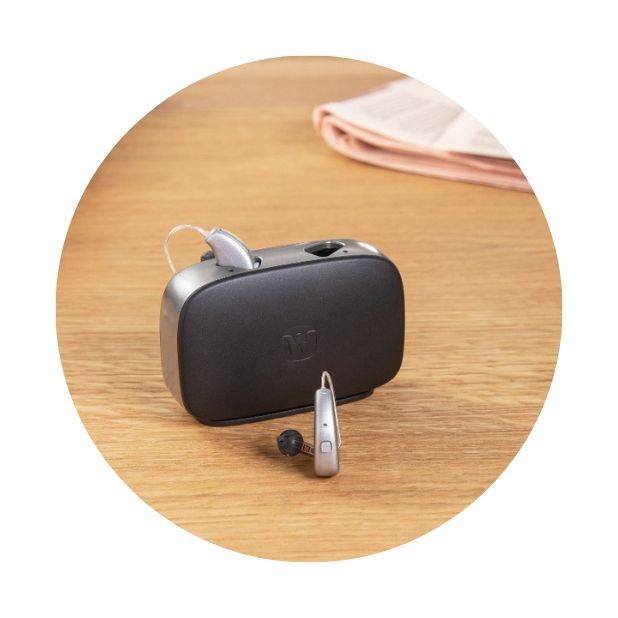
For those who are active and have hearing loss, fully charged and reliable hearing solutions are important. Rechargeable hearing aids are a great option with batteries that last 24 hours or more on a single charge (in some cases).
Rechargeable hearing aids are designed to keep up with your life and offer Bluetooth capability and app syncs that will deliver a host of personalisations that can support your hearing whilst on the go.
Rechargeable hearing aids have, in many ways, revolutionised the field of audiology. It provides numerous benefits to individuals with hearing loss.
These devices, powered by rechargeable batteries, offer convenience, environmental sustainability, cost savings, improved performance, and accessibility.
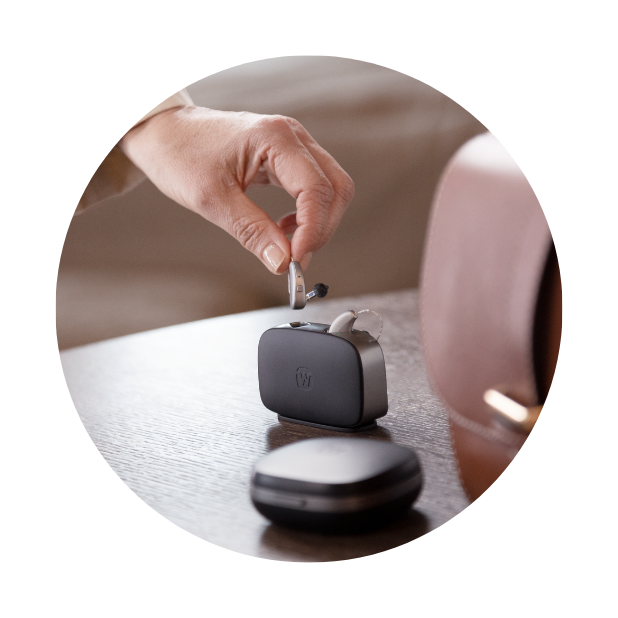
Gone are the days of fumbling with tiny disposable batteries and worrying about their lifespan. With rechargeable hearing aids, users can simply place their devices in a charging station, making the overall experience more user-friendly and hassle-free.
Here, we go through the benefits and features of rechargeable hearing aids, and how they can support your hearing and deliver advanced technology. Our audiologist, Paul Harrison, expertly recommends the best rechargeable hearing aids on the market today.
Read on to discover more about the best rechargeable hearing aids and whether they are the right fit for you and your hearing loss.
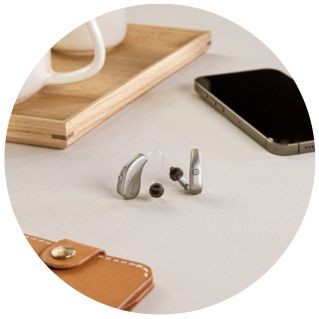
Rechargeable hearing aids are a type of hearing aid that uses a rechargeable battery instead of disposable batteries. These types of hearing aids can be convenient and cost-effective for people with hearing loss, as they eliminate the need to constantly purchase and replace batteries.
One of the main benefits of rechargeable hearing aids is their convenience. With traditional hearing aids, users need to constantly purchase and replace batteries, which can be inconvenient and costly.
Rechargeable hearing aids, on the other hand, can be charged using a charging station or a micro USB cable, which means that users only need to replace the battery every few years (depending on the specific hearing aid).
There is a definitive gap between the digital hearing aids of today and the ones your parents or grandparents used to use. Alongside Bluetooth technology, one of the most exciting recent developments is rechargeable hearing aids.
Hearing aids are either powered by disposable or rechargeable batteries. Whilst traditional batteries are still popular, more people are looking to the freedom and convenience of rechargeables. Industry predictions indicate that soon rechargeable solutions will become more attractive to consumers than traditional ones.
Phonak was the first hearing aid manufacturer to include rechargeable lithium-ion batteries in their devices, which simply mirrors the technology found in your smartphone and other rechargeable consumables. Providing a reliable connection and power even to the most power-hungry of Bluetooth devices.
Around four years later, all the rest of the main hearing aid brands followed suit, as constant technology advancements led to increasing battery life and paving the way for more malleable and smaller form factors.
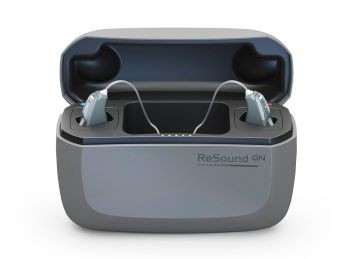
For a long time, hearing aids have relied solely on disposable zinc-air batteries. It’s easy to see why, as they are cheap, simple to replace, and widely available. But with rechargeable technology making headway in other consumer devices such as smartphones, e-readers, and tablets, people started to demand the same convenience with their hearing aids.
You might be thinking about upgrading, switching to a rechargeable device, and preferring not to change your batteries. You won't be on your own, as hearing aid wearers are now making it obvious that they prefer rechargeable models over disposable ones.
Saying that they are not for everyone and along with useful information, discovering what's available, and our review further down the page, we hope to help you decide whether they are right for you.
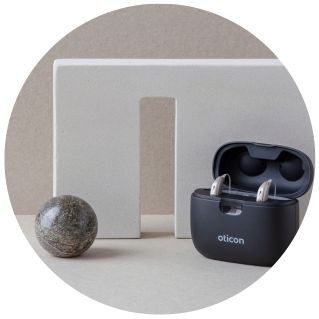
There are many reasons to take advantage of lithium-ion rechargeable hearing aid technology. Take a look at the rechargeable hearing aid pros and how they work to see if you think investing in them would be a benefit to you.
If you are wondering how rechargeable hearing aids work, you simply place the rechargeable hearing aids in the charging dock overnight to charge and your hearing devices are primed and ready to go in the morning. Most models take advantage of inductive charging, which makes it even easier to charge your hearing aids before bed.
You don't have to remember to buy batteries or carry spares, and your battery won't let you down at the most inopportune times.
Rechargeable hearing aid batteries also contribute to saving the environment. Batteries are fairly difficult to recycle, and people don't usually make sure that they are carefully disposed of. Rechargeable batteries must, of course, also be carefully disposed of, but this is much less often than the average hearing aid battery!
They often contain heavy metals and other toxic substances that can leach into the soil and water. These are usually corrosive materials and are commonly found in many hearing aid batteries because of the battery production process. The casing can disintegrate if the batteries are not properly disposed of, causing these harmful substances to leak into the environment.
This can lead to soil and water contamination and can negatively affect animals as well as humans. Rechargeable hearing aids, on the other hand, are more environmentally friendly, as they can be charged and reused multiple times.
You don't have to mess with small batteries every few days with rechargeable hearing aid batteries. If someone has visual or dexterity issues, the small size of conventional disposable hearing aid batteries and hearing aids themselves can be tricky to replace.
Batteries did not need to be replaced often with older hearing aid models because they had no wireless or digital functionality. But traditional zinc-air batteries do not last as long as they once did with newer hearing aid models, because of today's more advanced technology. You could have to switch the batteries a few times a week, instead of once a month.
But lithium-ion rechargeable hearing aid batteries can keep up with all the power needs of today's digital technology while maintaining enough charge for an entire day of hearing.
In addition to these benefits, rechargeable hearing aids may also offer some additional features that can improve the overall listening experience. For example, many models come with noise reduction and feedback reduction technologies, which can help to improve speech understanding in noisy environments.
They may also come with directional microphones, which can help to improve speech understanding by focusing on the person speaking in front of the wearer.
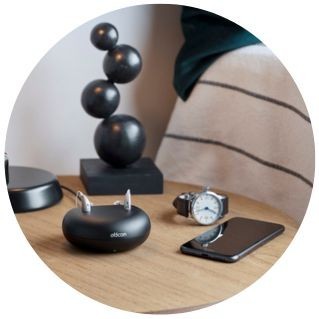
While rechargeable hearing aids offer several advantages, they also come with a few potential disadvantages that individuals should consider before making a decision. Here are some of the drawbacks associated with rechargeable hearing aids:
Rechargeable hearing aids are usually more expensive than traditional battery-operated hearing aids. The cost of the charging station or other accessories may need to be considered on top of the price of the hearing aids. While the long-term savings on battery replacements may offset the initial investment, the higher upfront cost can be a barrier for those on a tight budget.
Although rechargeable hearing aids offer the convenience of not having to replace batteries, they do have limited battery life and may require daily recharging. Advancements have been made in battery technology, however, they may still require daily charging or may not last a full day, especially for those who require extended device use.
Rechargeable hearing aids depend on a charging station or other charging equipment, which may be lost or damaged, leading to a temporary loss of hearing ability. These hearing aids require time to charge fully. This means that if the battery runs out unexpectedly, you may need to wait for the hearing aids to recharge before you can use them again.
Rechargeable batteries may perform poorly in cold temperatures, which can impact the performance of rechargeable hearing aids.
Don't forget to read our consumer tick list to help you make an informed decision, if you are considering rechargeable hearing aids further down the page.
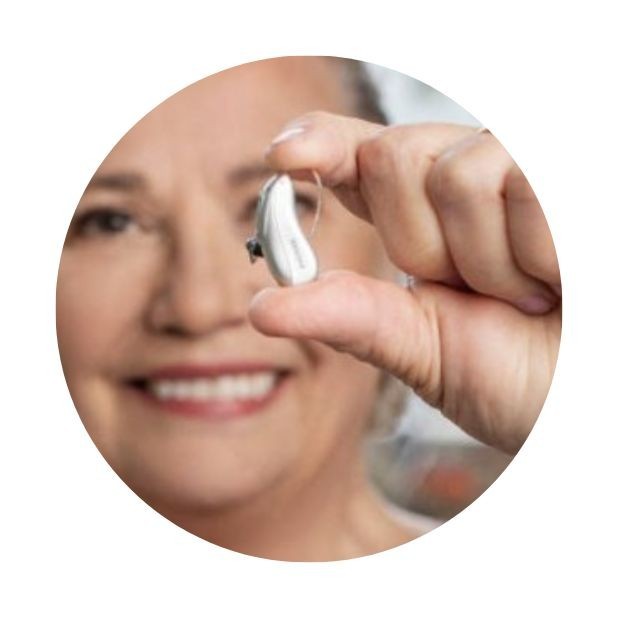
All hearing aid brands offer rechargeable hearing aid models. Here is a list of the main manufacturers with rechargeable hearing aid device options available:
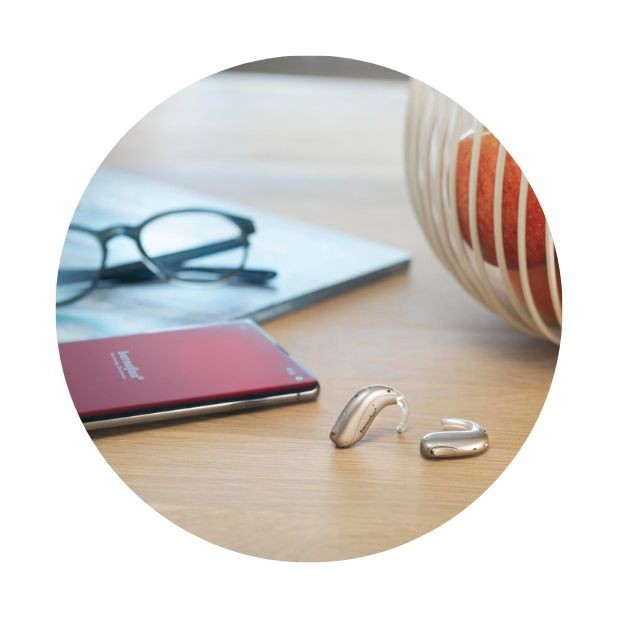
It's important to consult with a hearing healthcare professional or audiologist to determine if rechargeable hearing aids are suitable for your hearing loss and lifestyle.
However, our audiologists have provided a guide to the best three rechargeable hearing aids below, which we hope will help you select the best hearing aids for your needs.
This list will change throughout the year to reflect new hearing aid launches, advanced technology, and if we feel there is a better alternative.

The Resound Nexia 9 hearing aids offer a premium hearing experience, with a particular focus on rechargeable technology. These devices are designed to provide all-day power, eliminating the need for frequent battery changes. The sleek and discreet design houses a powerful battery, ensuring uninterrupted listening throughout the day.
With a quick charge feature, you can top up the battery in a short amount of time, providing flexibility and convenience. The Resound Nexia 9 also offers advanced hearing technology, including noise reduction and directional microphones, to enhance speech understanding in various listening environments.
As well as benefiting from reduced feedback, maintaining amplification without sound quality loss and a 150% improvement in speech understanding, these rechargeable hearing aids have a powerful battery that gives you a comfortable 30 hours of wear from a single charge. They are also durable as they have a nano-coating and come with either a premium, standard, or desktop charger.
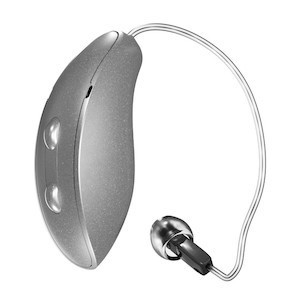
This rechargeable hearing aid provides wearers with up to 80 million adjustments each hour, along with advanced rechargeable technology. These cutting-edge hearing aids use their AI capabilities to redefine the way we process sound. This range also features Starkey's DNN (Deep Neural Network) and the industry's most advanced Neuro processor.
Starkey Edge AI 24 comes with improvements in battery life that can give up to 51 hours on a single charge, and with just 7 minutes of charging, 3 hours of use when using the Premium Custom Mini Charge, for on-the-go charging.
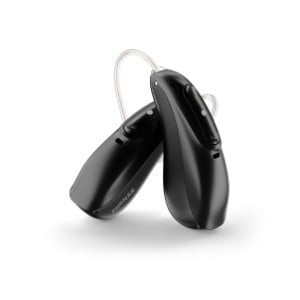
The Phonak Audeo Infinio Sphere i90 hearing aids offer a seamless, rechargeable listening experience. With a powerful, long-lasting battery, these devices eliminate the need for frequent battery changes, providing all-day hearing clarity. The quick-charge feature ensures you can top up the battery in a short amount of time, offering flexibility and convenience.
Designed to seamlessly integrate into your daily life, the i90 delivers exceptional sound quality and advanced features, all powered by a Phonak's reliable rechargeable battery.
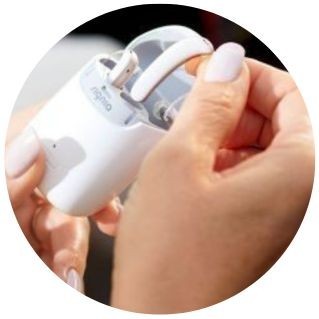
Here is our consumer ticklist for those who are thinking about rechargeable hearing aids, and some ideas of questions you might want to ask your audiologist. We hope you find this criterion useful:
Check the estimated battery life provided by the manufacturer. Ensure that the battery life is sufficient to meet your daily hearing needs - including streaming.
Understand the charging options available for your hearing aids. Check if the hearing aids come with a charging system, charging case, or USB cable. Consider which charging method best suits your lifestyle.
Inquire about the approximate time it takes to fully charge the rechargeable hearing aids. Faster charging times can be advantageous, especially if you have an active lifestyle.
Explore if the hearing aids have power-saving features or advanced power management systems. These features can help extend battery life and optimise the usage of power throughout the day.
Ensure that the rechargeable hearing aids are compatible with your level of hearing loss. Different models cater to different hearing needs, so it's essential to find the right fit for your hearing profile.
Consider the different styles and sizes of rechargeable hearing aids available. Choose a style that suits your preferences, comfort, and any specific physical considerations you may have. This might be dexterity issues or the need for a discreet design.
Evaluate the cost of rechargeable hearing aids, including the initial purchase price and any additional accessories or charging devices required that might be extra. Compare the long-term cost savings of rechargeable batteries versus disposable batteries.
Inquire about the warranty provided by the manufacturer and the availability of aftercare support.
Looking for the best rechargeable hearing aids near me? Despite the many benefits, there are also some potential drawbacks to consider when it comes to hearing aids with rechargeable batteries. One potential issue is that they may require frequent charging, which can be inconvenient for people who are always on the go.
Overall, rechargeable hearing aids can be a convenient and cost-effective option for people with hearing loss. If you are considering this type of hearing aid, it's a good idea to speak with an audiologist call us free on 0800 567 7621
Do not spend hundreds of pounds without getting a second opinion from us.
 Not only are the prices great, but the service is fantastic! Many thanks to your team.
Not only are the prices great, but the service is fantastic! Many thanks to your team.The batteries are built into the rechargeable hearing aids and they don't need to be changed or removed like disposable battery-operated devices. Instead, you simply put your hearing aids in the charging system overnight, like you would do your mobile, and have a fully charged hearing solution to wake up to.
Successive iterations of rechargeable digital hearing aid technology were subsequently developed, each improving on the last. But the latest development, called lithium-ion technology, maybe the best yet. This game-changing technology is the first to achieve full days worth of power on one charge.
Rechargeable hearing aids generally look the same as the ones that require you to change the battery. In some cases, the shape might be more slim-lined or shorter, as the model doesn't have a battery compartment door.
Are rechargeable hearing aids more expensive? If you are wondering how much rechargeable hearing aids cost - expect to pay slightly more for these types of devices. Rechargeable hearing aids are generally premium products from the industry's top hearing aid brands.
As a rough guide of the average cost of rechargeable hearing aids - a pair usually starts from around £1,095 (based on our prices). However, it really depends on what features and functions they have as well as the hearing aid manufacturer.
Is there such a thing as cheap rechargeable hearing aids? We know that 'cheap' is subjective and what one person thinks is expensive differs from another.
However, there are great examples of affordable rechargeable hearing aids on the market to choose from that your audiologist can show you.
How long do the batteries in rechargeable hearing aids last? Pretty much all rechargeable hearing aid manufacturers state that their ranges offer a full day of power in one single charge, then you can recharge them while you sleep. The duration of battery life depends on how you use your hearing aids. For instance, if you stream quite a lot during the day - the batteries won't last as long.
Drying rechargeable hearing aids is easy, you can purchase a rechargeable hearing aid dryer online or through your audiologist.
Rechargeable hearing aid dryers are devices used to dry and maintain the performance of rechargeable hearing aids. These dryers are designed to remove moisture, sweat, and other forms of condensation from rechargeable hearing aids, helping to prevent damage and extend their lifespan.
When cleaning rechargeable hearing aids, always avoid using water, solvents, or abrasive cleaning materials, as these can damage hearing aids. Also, always refer to the manufacturer's instructions for specific cleaning and maintenance guidelines for your hearing aids.
Can you get rechargeable hearing aids on NHS? Yes, rechargeable hearing aids are available on the National Health Service (NHS) in the UK. The availability of rechargeable hearing aids through the NHS depends on several factors, including your individual hearing needs, the resources available in your local area, and the decisions made by local clinical commissioning groups (CCGs).
When we refer to a product as 'Latest Launch', we mean it is the latest to be released on the market.
When we refer to a product as 'New', we mean that the product is the newest hearing aid model on the market.
When we refer to a product as 'Superseded', we mean that there is a newer range available which replaces and improves on this product.
When we refer to a product as an 'Older Model', we mean that it is has been superseded by at least two more recent hearing aid ranges.